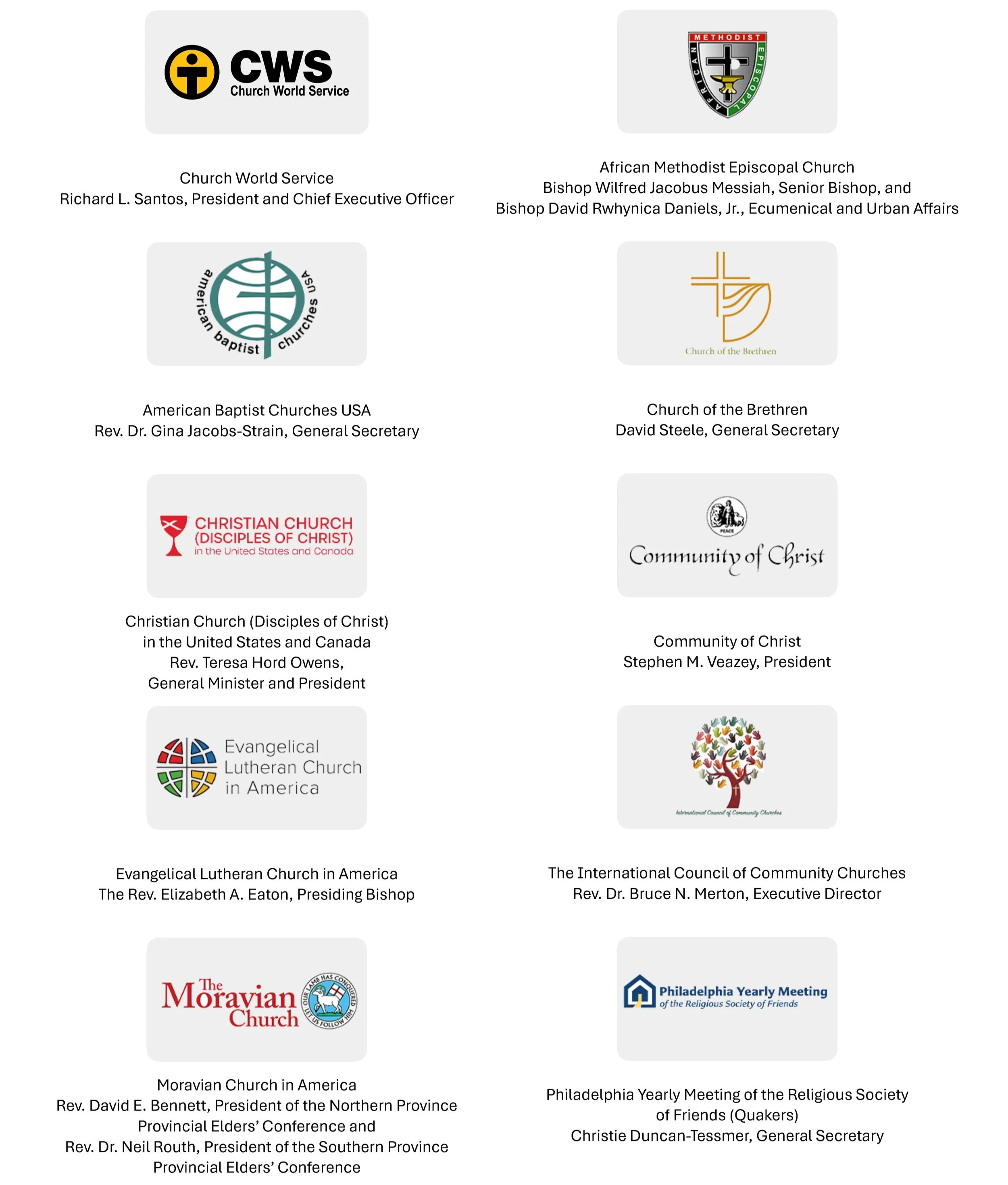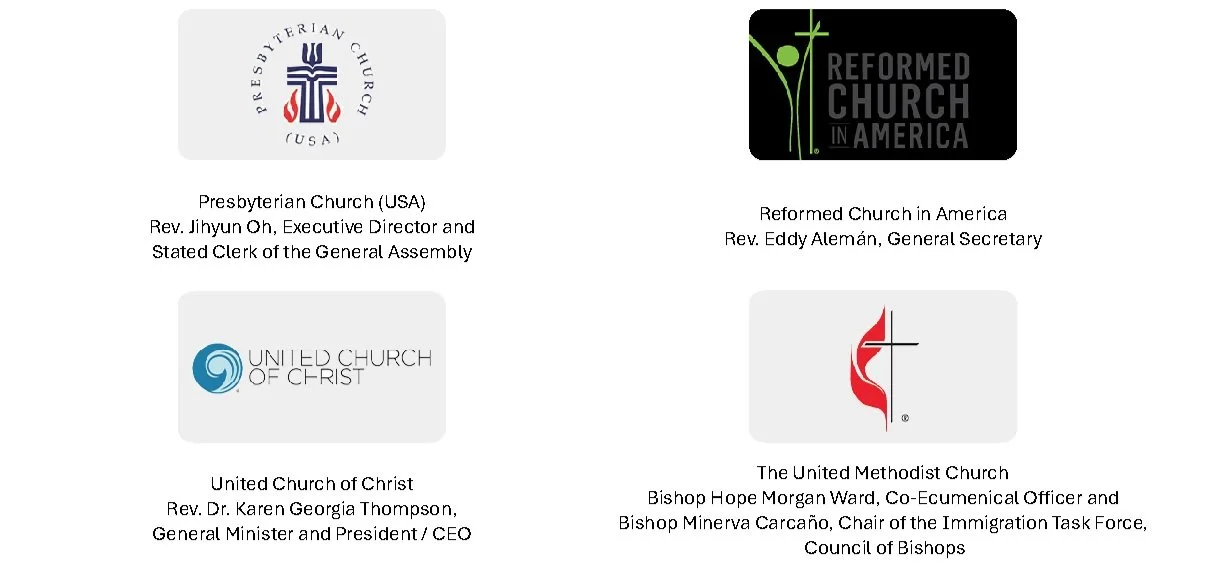The Ash Wednesday Ecumenical Declaration: Defending Refuge
"Remember that you are dust, and to dust you shall return." These solemn words from Genesis 3:19 will be spoken in congregations worldwide this Ash Wednesday, inviting the church to reflect on our shared humanity. In many services, they will be followed by Jesus' words to his disciples as he broke bread and shared the cup, commanding them to “do this in remembrance of me.” Remembering is a fundamental practice of faith, especially in moments of great significance. Among the Bible's many calls to remember, God’s people are specifically instructed to remember “that you were foreigners” in a foreign land (Leviticus 19:34).
“Defending Refuge
The Call to Faithful Action Starts Now
Every day, families seeking refuge face fear, separation, and uncertainty. Parents are forced to make impossible choices. Children endure journeys no child should have to take. And as our nation reckons with how it will treat the most vulnerable, we are called—as people of faith—to respond.
This Ash Wednesday, we remember. We remember our shared humanity. We remember that we, too, were once strangers in a foreign land. And we remember that faith calls us to act.”
With our nation now facing critical decisions about how it will uphold its most cherished values in relation to vulnerable immigrants and refugees, this ecumenical declaration urges the church to ground itself in Scripture. It also challenges our political leaders to remember that we are largely a nation of immigrants, and that how we treat the most vulnerable among us speaks volumes about our power and values on the global stage.
As we begin Lent, Ash Wednesday also calls us to reflect on what it means to be followers of Jesus who gave his life for the redemption of a broken and suffering world. What is expected of us?
Declaration
Together in faith and rooted in love, we resolve to continue in the centuries-old practice of Christian communities walking alongside refugees and immigrants in their pursuit of safety and dignity. We pledge to restore and promote hospitality and welcome to those seeking refuge - regardless of where they are from, how they pray or what language they speak.
This is a critical moment in the history of our nation and our world. Refugee and immigrant communities in the United States are increasingly the subject of misinformation, cruelty, fearmongering and criminalization, while government policies seek to decimate our nation’s long-standing commitment to welcoming and protecting those seeking safety.
Amidst an unprecedented wave of human displacement driven by conflict, persecution and the widening impacts of climate change, the federal government now seeks to: ban refugees from entering our country, revoke temporary protected status for immigrants unable to safely return home, undermine the 14th Amendment’s right to birthright citizenship, suspend foreign assistance to at-risk families around the world, erode the sanctity of places of worship, and dismantle our national capacity to assist refugees, asylum seekers and immigrants both at home and abroad.
Guided by our faith, we stand together against the sweeping measures that are devastating vulnerable families and jeopardizing their futures. These actions not only cause immediate harm but also threaten our country’s long-term ability to welcome and support those in need.
We grieve for the families who have been torn apart, had years-long reunification plans cancelled, been detained and deported, have been unjustly blocked from accessing asylum protections, and have been left without access to the basic assistance they need to thrive.
Our faith communities share a long history of working together to welcome refugees and immigrants into our neighborhoods, our churches, our schools, our workplaces and our lives. Many of our churches first took root in the United States as immigrant churches seeking religious freedom in a new land. Refugees, asylum seekers and immigrants make our communities more vibrant, prosperous, and secure. Newcomers offer our communities the opportunity to learn more about ourselves, our world, and indeed our faith.
We stand united in our resolve to love our neighbor as ourselves, to act justly, love mercy and walk humbly with our God (Micah 6:8) in fellowship with the vulnerable, the outcast, the widow, the orphan, the immigrant and all persons in need.
We pledge to advocate for the protection of refugees, immigrants and vulnerable people seeking safety. We commit to holding our elected leaders accountable to upholding this country’s values of compassion, generosity and welcome.
We acknowledge that all nations have the sovereign right to enforce their borders and laws, but that they must also ensure their enforcement is fair and just.
We pledge to defend the rights and dignity of refugees and immigrants through prayer and faithful action. We reject attempts to dismantle this country’s life-saving refugee resettlement program, to withhold protection to asylum seekers fleeing violence and persecution, to deny immigrants and refugees in our communities access to basic support, and to send families back into danger.
We dedicate ourselves to promoting truth, engaging in peaceful dialogue and speaking out against dehumanizing and divisive rhetoric.
“Let us love, not in word or speech, but in truth and action” (1 John 3:18). Together, let us protect welcome and restore hope – for we are all truly greater as one.
Our Commitments
We hereby commit ourselves to protecting and renewing the tradition of welcoming all people — regardless of where they are from, how they pray or what language they speak. As we are reminded by Jesus in Matthew 25:35, “For I was a stranger and you welcomed me.” We recognize the face of Christ in each refugee and each immigrant. In this spirit, we pledge to:
Advocate to this administration to reverse the executive orders and other policies being enacted that aim to deny refugees, asylum seekers, and immigrants the opportunity to seek safety in the United States.
Advocate to local, state, and national policy makers to do everything in their power to renounce these executive actions, to champion welcoming policies, and to ensure that adequate resources and social services reach the refugees and immigrants who need them.
Engage our congregations in honoring the journeys of refugees and immigrants through Sunday services and church activities at least once between Ash Wednesday and Easter, and then again in celebration of World Refugee Day (June 20), educating our communities about the biblical call to welcome, and inviting our congregation members to support and advocate for refugees and immigrants in our communities.
Provide resources, support and encouragement to our congregations in their efforts to organize public, prayerful expressions of welcome and support for refugees and immigrants, including through events and direct actions in the public square.
Work alongside refugee and immigrant leaders to identify and help address urgent needs in their communities.
Defend the sanctity of places of worship amid escalating immigration enforcement, including by affirming that we welcome all, regardless of status, by speaking up for those fearful of mass deportation, and by helping individuals and congregations understand their Constitutional rights.
Invite other religious communities to join in these commitments to amplify our collective and multifaith voice.
With this Ash Wednesday Ecumenical Declaration, we remember our shared humanity. During our Lenten journey and throughout the year, we pledge to stand together with our refugee and immigrant neighbors and to act as called upon by our faith.
Signed,
Organizations:
National Council of Churches of Christ in the USA, Bishop Vashti Murphy McKenzie, President and General Secretary
AME Zion Church, Bishop Darin Moore
Catholic Legal Immigration Network, Inc., Karen Sullivan, Director of Advocacy
The Episcopal Church, Rebecca Blachly, Chief of Public Policy and Witness
Friends United Meeting, Kelly Kellum, General Secretary
Latino Christian National Network, Carlos L. Malave, President
Mennonite Central Committee US, Ann Hershberger, Executive Director
Sojourners, Adam Taylor, President
World Relief, Myal Greene, President and CEO
Ascentria Care Alliance, Angela Bovill, President and CEO
Ecumenical Ministries of Oregon, Frank So, Executive Director
Florida Council of Churches, Rev. Dr. Russell Meyer
IRIS Integrated Refugee and Immigrant Services, Maggie Mitchell Salem, Executive Director
Journeys End Refugee Services, Pam Kefi, CEO
Lutheran Advocacy Ministry in PA, Tracey DePasquale, Director
Lutheran Community Services Northwest, David Duea, President and CEO
Lutheran Family Services Nebraska, Chris Tonniges, President and CEO
Minnesota Council of Churches, Suzanne Kelly, CEO
Refugee Services, Catholic Charities of Oregon, Claudia Munoz, Program Director
St. Francis Seraph Catholic Church, Alan Hirt, Pastor
Wisconsin Council of Churches, Rev. Kerri Parker, Executive Director
Individuals:
Leonard Bagalwa, Executive Director, Utah Valley Refugees
Mayor Wilmot Collins, City of Helena, MT
Luke Glaze, Executive Director, Salem for Refugees
Rev. Dr. Alvin O’Neal Jackson, Former Moderator, Christian Church Disciples of Christ
Rev. Erin Jones, St. Andrew Lutheran Church
The Rev. Brenda Martin, Holy Trinity Lutheran Church
Friar John Quigley, Franciscan Friars OFM
Bishop Lawrence Reddick, Senior Bishop, Christian Methodist Episcopal Church
Cynthia Shabb, Zion United Methodist Church




